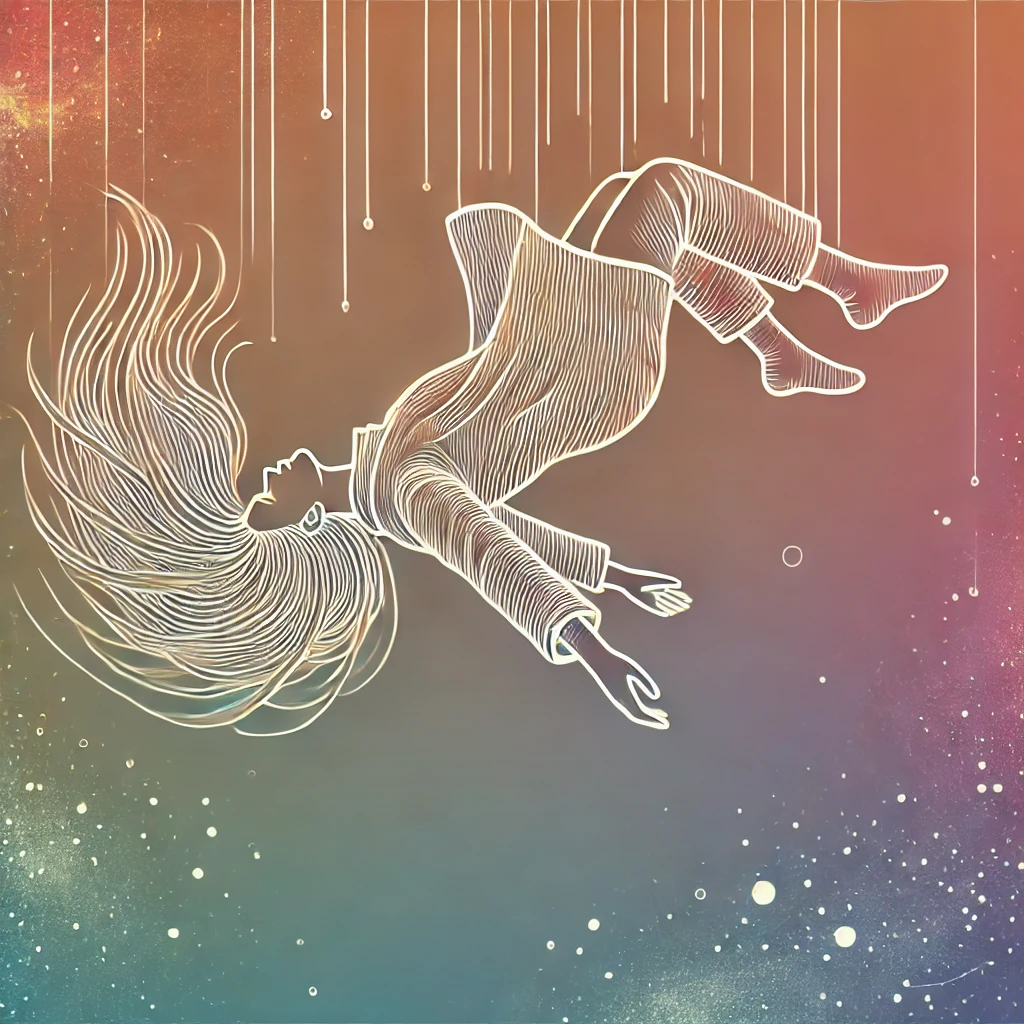夜に駆ける [Yoru ni Kakeru]
YOASOBI [Yoasobi]
Words & Music : Ayase [Ayase]
Yoasobi is a duo composed of singer Lilas Ikuta and composer Ayase. They emerged from a project that turns amateur novels posted on a novel submission site into music. Yoru ni Kakeru is a song that follows this concept, with its lyrics based on a novel.
By the way, let me explain the meaning of the group’s name, “Yoasobi”. In Japanese, it is written as “夜遊び.”

- 夜(よる・よ) [yoru / yo] : night
- 遊び(あそび) [asobi] : play, have a good time
“夜遊び / Yoasobi” means to go out at night, to play until late. It’s an exciting word, don’t you think? Incidentally, around the same time, music groups such as “ヨルシカ = Yorushika” (=just only night) and “ずっと真夜中でいいのに。/ zutto mayonaka de iinoni = Zutomayo” (=It’s Fine Being Midnight Forever) debuted. All of these groups have “夜 / yoru” (=night) in their names, so they were often grouped under the keyword “夜行性 / yakōsei” (=nocturnal creatures).
The title of this song, ”夜に駆ける / yoru ni kakeru” also uses the word “夜 / yoru”.
- 駆ける(かける) [kakeru] : run
“夜に駆ける / yoru ni kakeru” means “run into the night.”
沈むように溶けてゆくように
shizumu yō ni tokete yuku yō ni
二人だけの空が広がる夜に
futari dake no sora ga hirogaru yoru ni
- 沈む(しずむ) [shizumu] : sink
- ..ように [yō ni] : as if
- 溶ける(とける) [tokeru] : melt
- 二人(ふたり) [futari] : two people
- だけ [dake] : only
- 空(そら) [sora] : sky
- 広がる(ひろがる) [hirogāru] : spread
(translation) “As if sinking, as if melting,
On a night when the sky just for the two of us expands.”
“..ように” (yō ni) is a phrase used to describe something happening in a certain manner. Normally, it would be followed by a verb, but here it doesn’t appear.
「さよなら」だけだった
“sayonara” dake datta
その一言で全てが分かった
sono hitokoto de subete ga wakatta
日が沈み出した空と君の姿
hi ga shizumidashita sora to kimi no sugata
フェンス越しに重なっていた
fensu goshi ni kasanatte ita
- さようなら [sayōnara] : goodbye
- 一言(ひとこと) [hitokoto] : single word
- 全て(すべて) [subete] : all
- わかる(わかる) [wakaru] : understand
- 日(ひ) [hi] : sun
- 空(そら) [sora] : sky
- 君(きみ) [kimi] : you
- 姿(すがた) [sugata] : figure
- フェンス越し(ふぇんすごし) [fensu goshi] : across the fence
- 重なる(かさなる) [kasanaru] : overlap
(translation) “It was just ‘goodbye.’
With that single word, I understood everything.
The sun began to set, and your figure
Overlapped with the sky across the fence.”
“だった / datta” and “分かった / wakatta,” with verbs or auxiliary verbs ending in “た / ta,” indicate past tense. It creates a somewhat literary atmosphere.
初めて会った日から
hajimete atta hi kara
僕の心の全てを奪った
boku no kokoro no subete o ubatta
どこか儚い空気を纏う君は
dokoka hakanai kūki o matou kimi wa
寂しい目をしてたんだ
sabishī me o shite tanda
- 初めて(はじめて) [hajimete] : first time
- 会う(あう) [au] : meet
- 心(こころ) [kokoro] : heart
- 奪う(うばう) [ubau] : steal
- どこか [dokoka] : somewhere
- 儚い(はかない) [hakanai] : fleeting
- 空気(くうき) [kūki] : air
- まとう(まとう) [matou] : to wear
- 寂しい(さびしい) [sabishī] : lonely
- 目(め) [me] : eyes
(translation) “From the day we first met,
You stole my entire heart.
You, who always had an air of fleetingness,
Had lonely eyes.”
いつだってチックタックと
itsu datte chikutakku to
鳴る世界で何度だってさ
naru sekai de nando datte sa
触れる心無い言葉うるさい声に
fureru kokoronai kotoba urusai koe ni
涙が零れそうでも
namida ga koboresō demo
ありきたりな喜び
arikitari na yorokobi
きっと二人なら見つけられる
kitto futari nara mitsukerareru
- いつだって [itsu datte] : always
- ちくたく [chikutaku] : tick-tock
- 鳴る(なる) [naru] : sound
- 世界(せかい) [sekai] : world
- 何度だって [nando datte] : countless times
- 触れる(ふれる) [fureru] : touch
- 心無い(こころない) [kokoronai] : heartless
- 言葉(ことば) [kotoba] : words
- うるさい [urusai] : noisy
- 声(こえ) [koe] : voice
- 涙(なみだ) [namida] : tears
- 溢れる(あふれる) [afureru] : overflow
- ありきたり [arikitari] : ordinary
- 喜び(よろこび) [yorokobi] : joy
- きっと [kitto] : surely
- 二人(ふたり) [futari] : two people
- 見つける(みつける) [mitsukeru] : find
(translation) “Always, tick-tock,
In a world where the sound repeats countless times,
Even when heartless words and noisy voices touch me
And my tears seem about to overflow,
The ordinary joys—
Surely, we can find them if it’s the two of us.”
“Chikutaku” is an onomatopoeia that represents the sound of an analog clock’s hands moving. It’s very similar to the English “tick-tock”!

騒がしい日々に笑えない君に
sawagashī hibi ni waraenai kimi ni
思い付く限り眩しい明日を
omoitsuku kagiri mabushī asu o
明けない夜に落ちてゆく前に
akenai yoru ni ochite yuku mae ni
僕の手を掴んでほら
boku no te o tsukande hora
忘れてしまいたくて閉じ込めた日々も
wasurete shimaitakute tojikometa hibi mo
抱きしめた温もりで溶かすから
dakishimeta nukumori de tokasu kara
怖くないよいつか日が昇るまで
kowakunai yo itsuka hi ga noboru made
二人でいよう
futari de iyō
- 騒がしい(さわがしい) [sawagashī] : noisy
- 日々(ひび) [hibi] : days
- 笑う(わらう) [warau] : laugh
- 思いつく限り(おもいつくかぎり) [omoitsuku kagiri] : as much as I can think of
- 眩しい(まぶしい) [mabushī] : bright
- 明日(あす) [asu] : tomorrow
- 明ける(あける) [akeru] : dawn
- 落ちる(おちる) [ochiru] : fall
- 前(まえ) [mae] : before
- 手(て) [te] : hand
- つかむ(つかむ) [tsukamu] : grab
- ほら [hora] : look
- 忘れる(わすれる) [wasureru] : forget
- 閉じ込める(とじこめる) [tojikomeru] : lock away
- 抱きしめる(だきしめる) [dakishimeru] : embrace
- 温もり(ぬくもり) [nukumori] : warmth
- 怖い(こわい) [kowai] : afraid
- いつか [itsuka] : someday
- 昇る(のぼる) [noboru] : rise
- いる [iru] : be
(translation) “To you, who can’t smile through the noisy days,
As much as I can think of, I wish for a bright tomorrow.
Before we fall into the endless night,
Grab my hand—look—
The days I wanted to forget and locked away
Will melt with the warmth of your embrace.
I’m not afraid—until the sun rises someday,
Let’s be together.”
From here on, I will omit the explanations of the words.
君にしか見えない
kimi ni shika mienai
何かを見つめる君が嫌いだ
nanika o mitsumeru kimi ga kirai da
見惚れているかのような恋するような
mihoれて iru ka no yō na koi suru yō na
そんな顔が嫌いだ
sonna kao ga kirai da
(translation) “I hate the way You stare at something only you can see.
Like you’re enchanted, like you’re in love—
I hate that expression.”
信じていたいけど信じれないこと
shinjite itai kedo shinjirenai koto
そんなのどうしたってきっと
sonna no dōshitatte kitto
これからだっていくつもあって
korekara datte ikutsu mo atte
そのたんび怒って泣いていくの
sono tanbi okotte naite iku no
それでもきっといつかはきっと僕らはきっと
soredemo kitto itsuka wa kitto bokura wa kitto
分かり合えるさ信じてるよ
wakariaeru sa shinjiteru yo
(translation) “I want to believe, but I can’t believe—
No matter what,
I’m sure that From now on, there will still be many times
We’ll get angry and cry.
Even so, I’m sure, someday, I’m sure, we’re sure to
Understand each other—I believe in that.”
もう嫌だって疲れたんだって
mō iya datte tsukareta n datte
がむしゃらに差し伸べた僕の手を振り払う君
gamushara ni sashino beta boku no te o furiharau kimi
もう嫌だって疲れたよなんて
mō iya datte tsukareta yo nante
本当は僕も言いたいんだ
hontō wa boku mo iitain da
(translation) “You say you’ve had enough, that you’re tired,
And you brush away my outstretched hand, offered desperately.
You say you’ve had enough, that you’re tired—
Truthfully, I want to say it too.”
ほらまたチックタックと
hora mata chikutakku to
鳴る世界で何度だってさ
naru sekai de nando datte sa
君の為に用意した言葉どれも届かない
kimi no tame ni yōishita kotoba dore mo todokanai
「終わりにしたい」だなんてさ
“owari ni shitai” da nante sa
釣られて言葉にした時
tsurarete kotoba ni shita toki
君は初めて笑った
kimi wa hajimete waratta
(translation) “Look, again, tick-tock,
In a world that keeps on turning,
None of the words I prepared for you ever reach you.
When I echoed back, ‘I want to end this,’
It was the first time you smiled.”
騒がしい日々に笑えなくなっていた
sawagashī hibi ni waraenaku natte ita
僕の目に映る君は綺麗だ
boku no me ni utsuru kimi wa kirei da
明けない夜に溢れた涙も
akenai yoru ni afureta namida mo
君の笑顔に溶けていく
kimi no egao ni tokete iku
(translation) “You had stopped smiling through the noisy days,
But in my eyes, you were beautiful.
Even the tears that overflowed in the endless night
Are melting away in your smile.”
変わらない日々に泣いていた僕を
kawaranai hibi ni naite ita boku o
君は優しく終わりへと誘う
kimi wa yasashiku owari e to izanau
沈むように溶けてゆくように
shizumu yō ni tokete yuku yō ni
染み付いた霧が晴れる
shimitsuita kiri ga hareru
忘れてしまいたくて閉じ込めた日々に
wasurete shimaitakute tojikometa hibi ni
差し伸べてくれた君の手を取る
sashinobete kureta kimi no te o toru
涼しい風が空を泳ぐように今吹き抜けていく
suzushī kaze ga sora o oyogu yō ni ima fukinukete iku
繋いだ手を離さないでよ
tsunaida te o hanasanaide yo
二人今、夜に駆け出していく
futari ima, yoru ni kakedashite iku
(translation) “I was crying in the unchanging days,
But you gently led me to the end.
As if sinking, as if melting,
The fog that had clung to me clears away.
The days I locked away, wanting to forget,
You reached out your hand and took mine.
A cool breeze swims through the sky, passing by now.
Don’t let go of the hand you’re holding.
The two of us now run into the night.”
It may seem like a love song, but the original novels (Tanatosu no Yūwaku and Yoru ni Tokeru by Maiya Hoshino) deal with much more sensational themes. The story goes as follows:
The protagonist, a man, receives a goodbye message from a woman who is captivated by the death drive, or “Thanatos.” The novel explores the man’s emotional struggle as he tries to stop her from attempting suicide by jumping off a building.
The music video also features scenes that more directly express the theme of suicide. If you want to fully immerse yourself in the allure of this song, it’s definitely worth watching.

Thanks for reading! Feel free to comment if you have any feedback or questions.
Follow me on X.



